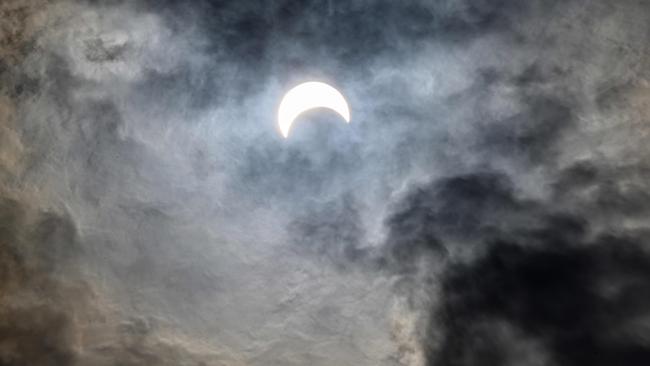‘Ring of fire’ eclipse wows across Asia
Skywatchers from Saudi Arabia to Singapore were treated to a rare solar eclipse.

Skywatchers from Saudi Arabia and Oman to India and Singapore were treated to a rare “ring of fire” solar eclipse on Thursday.
Annular eclipses occur when the moon is not close enough to the Earth to completely obscure the sun, leaving a thin ring of the solar disc visible. While these types of eclipses occur every year or two, they are only visible from a narrow band of Earth each time and it can be decades before the same pattern is repeated.
Depending on weather conditions, this year’s astronomical phenomenon was set to be visible from the Middle East across southern India and Southeast Asia before ending over the northern Pacific.
Hundreds of amateur astronomers and photographers set up by Singapore’s harbour for what some said was a “once in a lifetime” event. “The next one will happen in about 40 years I think,” said Jason Teng, 37, who used a solar filter on his telescope as there is no safe period to observe an annular solar eclipse.
In southern India, people gathered on the beaches in Tamil Nadu to watch the event.
The eclipse even affected cricket, with play delayed by two hours in a first-class match between Mumbai and Rajkot. But in New Delhi, cloud and pollution blocked the view and Prime Minister Narendra Modi tweeted his disappointment, although only a partial eclipse would have been visible that far north.
In Indonesia, hundreds of people gathered outside the Jakarta Planetarium to watch the event using protective glasses, hoping for clear skies at the time of maximum eclipse.
Outside the narrow band where the “ring of fire” effect can be observed, skywatchers would see a partial solar eclipse.
The next annular eclipse, next June, will be visible to a narrow band from Africa to northern Asia. The following one in June 2021 will only be seen in the Arctic and parts of Canada, Greenland and the Russian far east.
AFP


